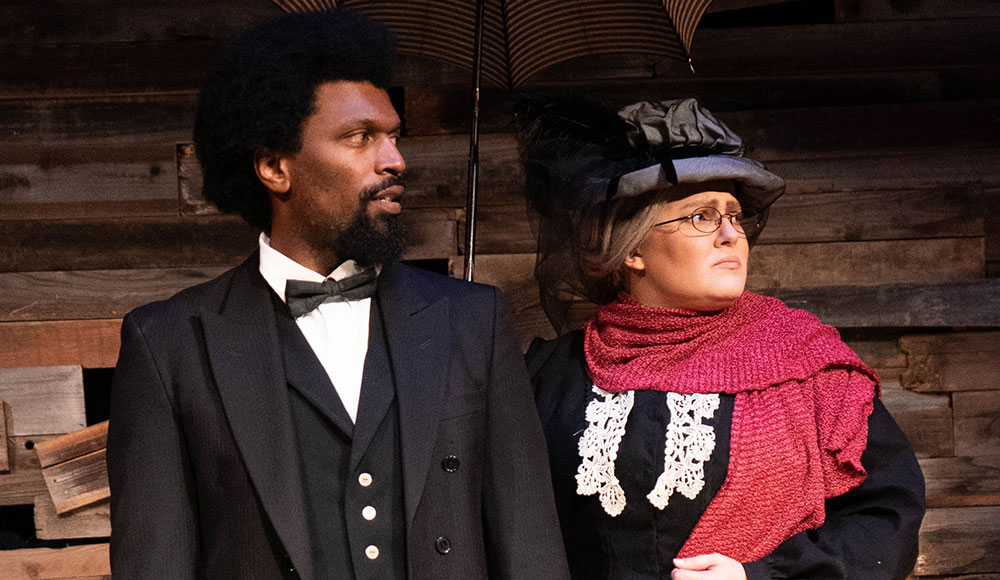After the recent presidential election results, Kerry Gudjohnsen, director of Pear Theatre’s production of The Agitators, says she feels like the country has taken one step forward, and two steps back. But she takes comfort from the play’s protagonists, Frederick Douglass and Susan B. Anthony.
“What’s inspiring to me is looking at the incredible odds they had stacked against them, and yet they persevered. They collaborated and learned from each other—through debates, discussion and arguments—but always through a lens of what was right for our society and standing up for an America that was their America as well.”
In the 1840s, Douglass and Anthony met in Rochester as young abolitionists, irrevocably united by their shared hopes, ambitions, and an unwavering commitment to social justice. At the time, they were fueled by dreams of creating a more equitable society.
Over several decades fraught with social, cultural and political turmoil, the friends rose to prominence as historic icons, championing monumental causes—Douglass for the abolition of slavery and racial equality, and Anthony for women’s suffrage.
After the Civil War, following the introduction of the 15th Amendment, their bond faced a new challenge as voting rights were granted to Black men but not to women.
Anthony and other suffragists felt betrayed, while Douglass prioritized racial equality, arguing that securing voting rights for Black men was an urgent necessity for their survival. Despite these differences, Anthony and Douglass maintained a mutual respect and admiration for each other, often sharing stages and continuing to collaborate to advance social justice.
Their 45-year friendship underscores the power and challenges of collaboration in the pursuit of justice, and their legacy of resilience and shared purpose continues to inspire works like The Agitators, written by playwright Mat Smart and playing at the Pear Theater in Mountain View through Dec. 15.
“America is still under construction, and it’s not a project we should walk away from,” Gudjohnsen says. “I think it’s up to us to figure out what this experiment should look like.”
The director was introduced to the script by the company’s artistic director, Sinjin Jones. “He and I met through a mutual friend in the theater and he presented the script to me for consideration,” Gudjohnsen says. “I was equally impressed and embarrassed that I didn’t know that Frederick Douglass and Susan B. Anthony were friends for 45 years.”
The two leading actors, Adam Torrian and Krista Joy Serpa, are best friends in real life, Gudjohnsen adds. And mirroring their real-life friendship, their trust between each other, helped the actors capture the complexity of Douglass and Anthony’s relationship on stage.


Serpa, who plays Anthony in the production, says she spent a lot of time reading Anthony and Douglass’ writings, and literature written about them to prepare for the portrayal of the complex historical figure.
“One of the most interesting challenges of this work is finding the balance of historical accuracy and dramatization. Mat Smart did an excellent job informing the play with real quotes and real details about their lives—even as he asks us to imagine a version of what certain moments and discussions looked like behind closed doors, each scene is rooted in something real and documented,” Serpa says. “We get to play and stretch theatrically within that framework, honoring the truth while also having fun as actors and using our imaginations to tell our version of this story.”
This is not a historical drama where the “human aspects” are removed from the two luminaries’ personalities, the director asserts. “They’re not perfect, pristine. And the way Adam and Krista bring these icons of justice alive … they’re human, they’re relatable.”
Serpa and Torrian both related to their characters overall, but found themselves resonating more strongly with aspects of each others’ characters’ personalities as well. “I relate to Frederick’s tenderness and emotion, and [Torrian] relates a lot to Susan’s pragmatism and stubbornness,” Serpa says. “It’s a privilege to have a friend who challenges you, shifts your perspective, calls you out, and loves you as you learn. That’s what this play is ultimately about. They each make mistakes, and they each broaden the others’ perspective.”
She adds, “And it’s funnier and more joyful than people would think.”
The play also speaks to today’s contemporary audiences and political timeline, with Torrian and Serpa reflecting Douglass and Anthony’s struggle for equality and justice—their triumphs, their arguments—all while illustrating the activists’ joy and bravery, as they faced the upheaval of the Civil War, and even more adversity in real life.
“The struggle for equality and justice is a song we’ve been hearing in this country for years. The only thing that changes is the key,” Torrian says. “Oppressors trying to disenfranchise or otherize a different group, whether it’s black people, queer people, immigrants. … It continues to this day. I hope people who come to see [The Agitators] come away with a newly sparked fire to be brave and speak out against the growing injustices in not only their own communities, but also the country as a whole. The more we talk about it, the more likely it is to change.”
The Agitators plays through Dec. 15 at the Pear Theatre in Mountain View. Tickets are $42. thepear.org



